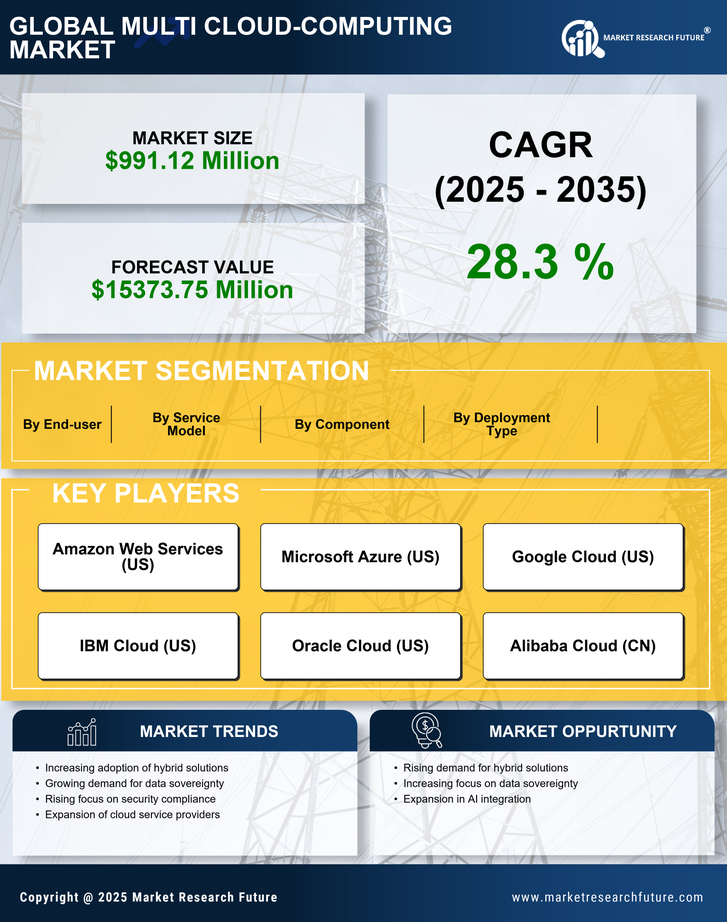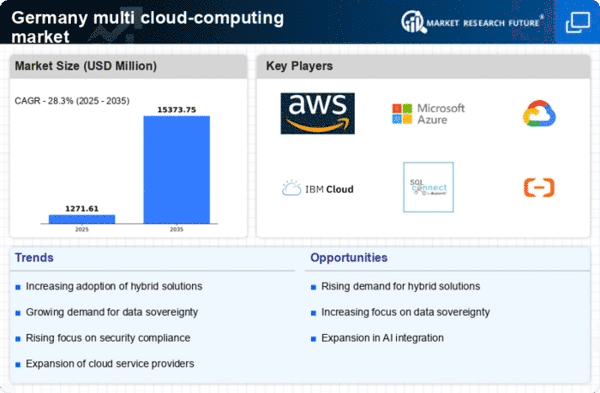Cost Optimization Strategies
Cost optimization remains a pivotal driver in the multi cloud-computing market, particularly for organizations in Germany. As businesses strive to enhance operational efficiency, they are increasingly turning to multi cloud strategies to leverage competitive pricing from various providers. Recent analyses suggest that companies can achieve cost savings of up to 30% by strategically distributing workloads across multiple cloud platforms. This trend is prompting organizations to reassess their cloud spending and explore innovative pricing models. The multi cloud-computing market is thus positioned for growth, as enterprises seek to balance performance and cost-effectiveness. Furthermore, the potential for reduced vendor lock-in through multi cloud approaches is likely to encourage more businesses to adopt these strategies, further fueling market expansion.
Growing Demand for Scalability
The multi cloud-computing market in Germany is experiencing a notable surge in demand for scalable solutions. Organizations are increasingly seeking the flexibility to adjust their computing resources based on fluctuating workloads. This trend is driven by the need for businesses to remain agile in a competitive landscape. According to recent data, approximately 70% of enterprises in Germany are prioritizing scalability in their cloud strategies. This growing demand is prompting cloud service providers to enhance their offerings, ensuring that they can accommodate varying resource requirements. As a result, the multi cloud-computing market is likely to witness significant growth, with projections indicating a compound annual growth rate (CAGR) of around 15% over the next five years. This focus on scalability is reshaping the competitive dynamics within the industry, as companies strive to deliver tailored solutions that meet diverse customer needs.
Enhanced Disaster Recovery Solutions
The multi cloud-computing market is witnessing a growing emphasis on enhanced disaster recovery solutions among German enterprises. As businesses increasingly recognize the importance of data resilience, they are adopting multi cloud strategies to ensure robust backup and recovery capabilities. Recent statistics indicate that nearly 50% of organizations in Germany have implemented multi cloud solutions specifically for disaster recovery purposes. This trend is driven by the need to minimize downtime and protect critical data assets. By leveraging multiple cloud environments, companies can create redundant systems that enhance their overall disaster recovery plans. Consequently, is expected to see increased investment in innovative recovery solutions.
Integration of Advanced Technologies
The integration of advanced technologies is emerging as a key driver in the multi cloud-computing market. Organizations in Germany are increasingly adopting artificial intelligence (AI), machine learning (ML), and Internet of Things (IoT) solutions within their multi cloud strategies. This trend is indicative of a broader shift towards digital transformation, where businesses seek to harness the power of data analytics and automation. Recent reports suggest that approximately 40% of German companies are actively exploring AI and ML applications in their cloud environments. This integration not only enhances operational efficiency but also enables organizations to derive actionable insights from their data. As a result, the multi cloud-computing market is poised for growth, as companies invest in advanced technologies to drive innovation and improve decision-making processes.
Regulatory Compliance and Data Protection
In the context of the multi cloud-computing market, regulatory compliance and data protection are becoming increasingly critical for organizations in Germany. With stringent regulations such as the General Data Protection Regulation (GDPR) in place, businesses are compelled to adopt cloud solutions that ensure compliance while safeguarding sensitive data. A recent survey indicates that over 60% of German companies consider compliance a top priority when selecting cloud service providers. This heightened focus on regulatory adherence is driving the demand for multi cloud strategies, as organizations seek to distribute their data across various platforms to mitigate risks. Consequently, the multi cloud-computing market is likely to expand as companies invest in solutions that not only meet compliance requirements but also enhance their overall data security posture.

















